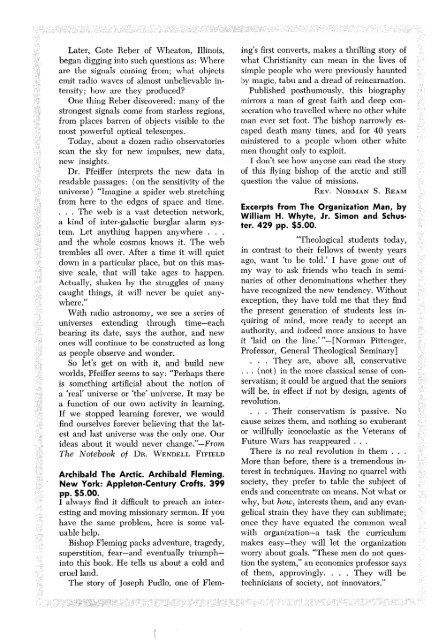You also want an ePaper? Increase the reach of your titles
YUMPU automatically turns print PDFs into web optimized ePapers that Google loves.
Later, Gote Reber of Wheaton, Illinois,<br />
began digging into such questions as: Where<br />
are the signals coming from; what objects<br />
emit radio waves of almost unbelievable intensity;<br />
how are they produced?<br />
One thing Reber discovered: many of the<br />
strongest signals come from starless regions,<br />
from places barren of objects visible to the<br />
most powerful optical telescopes.<br />
Today, about a dozen radio observatories<br />
scan the sky for new impulses, new data,<br />
new insights.<br />
Dr. Pfeiffer interprets the new data in<br />
readable passages: (on the sensitivity of the<br />
universe) "Imagine a spider web stretching<br />
from here to the edges of space and time.<br />
... The web is a vast detection network,<br />
a kind of inter-galactic burglar alarm system.<br />
Let anything happen anywhere . . .<br />
and the whole cosmos knows it. The web<br />
trembles all over. After a time it will quiet<br />
down in a particular place, but on this massive<br />
scale, that will take ages to happen.<br />
Actually, shaken by the struggles of many<br />
caught"things, it will never be quiet anywhere.<br />
With radio astronomy, we see a series of<br />
universes extending through time-each<br />
bearing its date, says the author, and new<br />
ones will continue to be constructed as long<br />
as people observe and wonder.<br />
So let's get on with it, and build new<br />
worlds, Pfeiffer seems to say: "Perhaps there<br />
is something artificial about the notion of<br />
a 'real' universe or 'the' universe. It may be<br />
a function of our own activity in learning.<br />
If we stopped learning forever, we would<br />
find ourselves forever believing that the latest<br />
and last universe was the only one. Our<br />
ideas about it would never change."-From<br />
The Notebook of DR. WENDELL FIFIELD<br />
Archibald The Arctic. Archibald Fleming.<br />
New York: Appleton-Century Crofts. 399<br />
pp. $5.00.<br />
I always nnd it difficult to preach an interesting<br />
and moving missionary sermon. If you<br />
have the same problem, here is somB valuable<br />
help.<br />
Bishop Flemil1g packs adventure, tragedy,<br />
superstition, fear-and eventually triumphinto<br />
this book. He tells us about a cold and<br />
cruel land.<br />
The story of Joseph Pudlo, one of Flem-<br />
ing's first converts, makes a thrilling story of<br />
what Christianity can mean in the lives of<br />
simple people who were previously haunted<br />
by magic, tabu and a dread of reincarnation.<br />
Published posthumously, this biography<br />
mirrors a man of great faith and deep consecration<br />
who travelled where no other white<br />
man ever set foot. The bishop narrowly escaped<br />
death many times, and for 40 years<br />
ministered to a people whom other white<br />
men thought only to exploit.<br />
I don't see how anyone can read the story<br />
of this flying bishop of the arctic and still<br />
question the value of missions.<br />
REV. NORMAN S. REAM<br />
Excerpts from The Organization Man, by<br />
William H. Whyte, Jr. Simon and Schuster.<br />
429 pp. $5.00.<br />
"Theological students today,<br />
in contrast to their fellows of twenty years<br />
ago, want 'to be told.' I have gone out of<br />
my way to ask friends who teach in seminaries<br />
of other denominations whether they<br />
have recognized the new tendency. Without<br />
exception, they have told me that they find<br />
the present generation of students less inquiring<br />
of mind, more ready to accept an<br />
authority, and indeed more anxious to have<br />
it 'laid on the line.' "-[Norman Pittenger,<br />
Professor, General Theological Seminary]<br />
. .. They are, above all, conservative<br />
. . . (not) in the more classical sense of conservatism;<br />
it could be argued that the seniors<br />
will be, in effect if not by design, agents of<br />
revolution.<br />
. .. Their conservatism is passive. No<br />
cause seizes them, and nothing so exuberant<br />
or willfully iconoclastic as the Veterans of<br />
Future Wars has reappeared ...<br />
There is no real revolution in them . . .<br />
More than before, there is a tremendous interest<br />
in techniques. Having no quarrel with<br />
society, they prefer to table the subject of<br />
ends and concentrate on means. Not what or<br />
why, but how, interests them, and any evangelical<br />
strain they have they can sublimate;<br />
once they have equated the common weal<br />
with organization-a task the cuvriculum<br />
makes easy-they will let the organization<br />
worry about goals. "These men do not question<br />
the system," an economics professor says<br />
of them, approvingly.... They will be<br />
technicians of society, not innovators."<br />
..<br />
·<br />
·<br />
·<br />
·<br />
·<br />
.
















